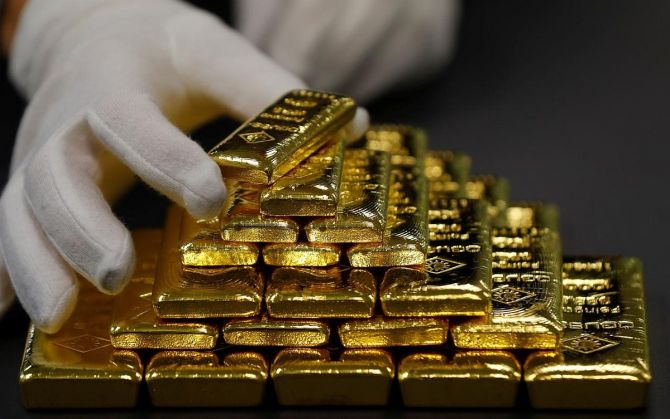Capital markets regulator Sebi on Monday came out with a framework for operationalising the gold exchange, wherein the yellow metal will be traded in the form of electronic gold receipts (EGRs).

The stock exchange desirous of trading in EGRs may apply to Sebi for approval of trading in the new segment, the regulator said in a circular.
The bourses can launch contracts with different denomination for trading or conversion of EGR into gold.
Under the new framework, the entire transaction has been divided into three tranches-- creation of EGR; trading of EGR on stock exchange and conversion of EGR into physical gold.
A common interface will be developed by depositories, which will be made accessible to all the entities -- vault managers, depositories, stock exchanges and clearing corporations.
The new framework will come into force with immediate effect, the Securities and Exchange Board of India (Sebi) said.
This comes after the government, through a notification on December 24, declared "electronic gold receipts" as 'securities' under the Securities Contracts (Regulation) Act 1956.
Separately, the regulator through a notification on December 31, notified rules for vault managers paving the way for operationalising gold exchange.
As per the Sebi circular, supply of the physical gold, to be converted into EGR, will be the fresh deposit of gold, coming into the vaults, either through imports or through stock exchange accredited domestic refineries.
The existing deposit of gold lying in the vaults, which meets the criteria and has never been out of the vaulting infrastructure, can be considered for conversion into EGR.
Vault managers will have to ensure that 'gold' to be converted into EGR meets the criteria.
The gold which complies either with LBMA Good Delivery Standard or with the India Good Delivery Standard, or any other standard specified by Sebi, will be eligible under this framework.
To lower the costs associated with withdrawal of gold from the vaults, EGRs have been made "fungible" and "interoperability between vault managers" have been allowed.
To increase the reach of gold exchange, all existing branches of vault managers may be allowed as 'collection and/or withdrawal center', which meets the safety standards, as specified by Sebi.
The storage and withdrawal charges will be levied by the vault managers and be collected by the depository from the beneficial owner of EGRs, for onward payment to the vault managers.
The charges will be disclosed by the vault managers upfront to the public at large.
Sebi said clearing corporations will empanel assaying agencies for checking the purity of gold, if required by the beneficial owner of the EGR at the time of withdrawal of gold from the vaults.
However, the charges towards assaying, transportation will be borne by such beneficial owner.
Such assaying charges will be disclosed upfront to the public at large.
Sebi said investors will have to be encouraged to utilize their own trusted means of transportation for movement of gold from vaults to their preferred location.
To facilitate the same, vault managers, at their discretion, may provide a list of logistics service providers on their website with relevant contact details.
However, Sebi or vault manager will not be responsible for any dispute arising from transportation of gold, irrespective of the choice of logistics service provider.
In the first tranche that relates to creation of physical gold, the regulator said the vault manager on receipt of physical gold will record the relevant information in the common interface and create the EGR.
The vault manager will have to ensure that no EGR is created without the presence of corresponding physical gold in its vaults.
The EGR will reflect in the demat account of the beneficial owner maintained with the depository participant.
The depository will have to take necessary action to make EGR tradeable on the stock exchange.
Under the second tranche, the stock exchanges will allow trading of EGRs on continuous basis.
Further, the depositories will have to share information pertaining to the creation of EGR, with the exchanges and clearing corporations on a periodic basis.
The details of such periodicity will be issued by Sebi in due course.
The clearing corporation will have to settle the trades executed on the stock exchange, by way of transferring EGR and cash to the buyer and seller of EGR, respectively.
Under the third tranche that relates to conversion of EGR into physical gold, the regulator has said that beneficial owner of EGR intending to obtain physical gold against the EGR will request the depository for the same.
The depository, in turn will forward such request to the vault manager.
The vault manager after delivering the gold to the beneficial owner and simultaneously extinguishing such EGR will share the required data with the depository for reconciliation.
The depository, in turn, will have to send the information about the extinguished EGR to the stock exchange and clearing corporation to carry out necessary revision in the records.
If there are any disputes, related to quality of physical gold, at the time of withdrawal of physical gold, the same would be dealt with by obtaining quality report from empanelled assayer.
Photograph: Leonhard Foeger/Reuters










